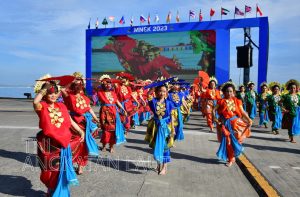Indonesia yesterday kicked off a rare multilateral naval exercise including vessels from the United States, China, Japan, and Russia, among many others, at a time of growing regional tension.
In a statement, the Indonesian Navy (TNI-AL) described the four-day Multilateral Naval Exercise Komodo as “a non-war exercise by prioritizing regional maritime cooperation, disaster management, and humanitarian operations to strengthen cooperation between the Indonesian Navy and friendly countries.” Fifteen vessels, including ships from China and Russia, dropped anchor off Sulawesi island yesterday as the Komodo drills began, the TNI-AL said.
This year’s Komodo drills, which will take place in the waters between Borneo and Sulawesi, are the fourth iteration of the naval exercise that Indonesia has hosted since it was established in 2014.
The Komodo exercises are less relevant for their content, which for the most part consists of simulated sea rescues and responses to humanitarian emergencies like natural disasters, than for the fact that they have brought together representatives from 36 nations, some of whom have bitter conflicts and disagreements. In addition to the U.S., Russia, and China, it also includes rivals India and Pakistan and both South and North Korea.
The drills opened a day after the conclusion of the Shangri-La Dialogue in Singapore, which saw senior U.S. and Chinese officials trade barbs over issues including Taiwan and the South China Sea. Beijing rebuffed a U.S. request for a meeting between Defense Minister Li Shangfu and Defense Secretary Lloyd Austin on the sidelines of the conference, due to the U.S. currently targeting Li. The U.S. likewise refused a Chinese request to lift the sanctions as a precondition for talks.
The paucity of communication was demonstrated in a dangerous incident that occurred in the Taiwan Strait while the Dialogue was in progress, when a Chinese warship came within 140 meters of the U.S. destroyer USS Chung-Hoon. The incident took place after U.S. and Canadian warships sailed through the sensitive waterway on a “freedom of navigation” operation.
Given the current level of mutual miscommunication and misperception between China and the U.S., the Indonesian naval drills represent a rare sign of concord and open communication. Indeed, Jakarta has had a creditable year in managing regional tensions, both as G-20 president, when it managed to negotiate the various diplomatic complications associated with the war in Ukraine, and this year’s chair of the Association of Southeast Asian Nations (ASEAN), in which capacity it is currently trying to push forward a solution to Myanmar’s conflict.
All of this reflects Indonesia’s attempt to strike a balance in an era of superpower competition – to attain what Evan Laksmana has referred to as “pragmatic equidistance.” It also appears to suggest that Indonesia, fortified by its “free and independent” foreign policy tradition, is a good candidate to bring together the many “non-aligned” nations in the Global South that are resisting the gradual crystallization of the world into competing neo-Cold War blocs.
































